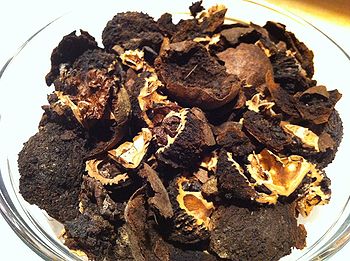Black Walnut
From Wikiwel
Other Names: Carya, Carya basilike, Carya persica, Green Black Walnut, Green Walnut, Juglans nigra, Jupiter's Nuts, Nogal Americano, Nogal Negro, Nogueira-preta, Noix, Noix de Jupiter, Noix de Perse, Noix Verte, Noyer d’Amérique, Noyer Noir, Noyer Noir Américain, Nux persica, Nux regia, Schwarze Walnuss, Walnoot, Walnut.
Black walnut is a tree. People use the outer covering of the nut (the hull) to make medicine.
Black walnut is a tree. People use the outer covering of the nut (the hull) to make medicine.
Special Precautions of Black Walnut
- Black walnut might be safe for most people when taken by mouth short-term. It is not known what the possible side effects from short-term use might be.
- Black walnut might be unsafe when applied to the skin. It contains a chemical called juglone that might cause tongue or lip cancer, especially if applied daily.
- Pregnancy and breast-feeding: Don’t apply black walnut to the skin if you are pregnant or breast-feeding. This topical use might be unsafe. It’s also best to avoid oral use. Not enough is known about the safety of taking black walnut by mouth during pregnancy or breast-feeding.
- Medications taken by mouth (Oral drugs) interacts with Black Walnut.
Benefits and uses of Black Walnut are
Black walnut contains high concentrations of chemicals called tannins, which can reduce pain and swelling and dry up body fluids such as mucous.
- Leukemia.
- Diphtheria.
- Syphilis.
- Intestinal worms.
- Use as a gargle.
- Skin wounds.
